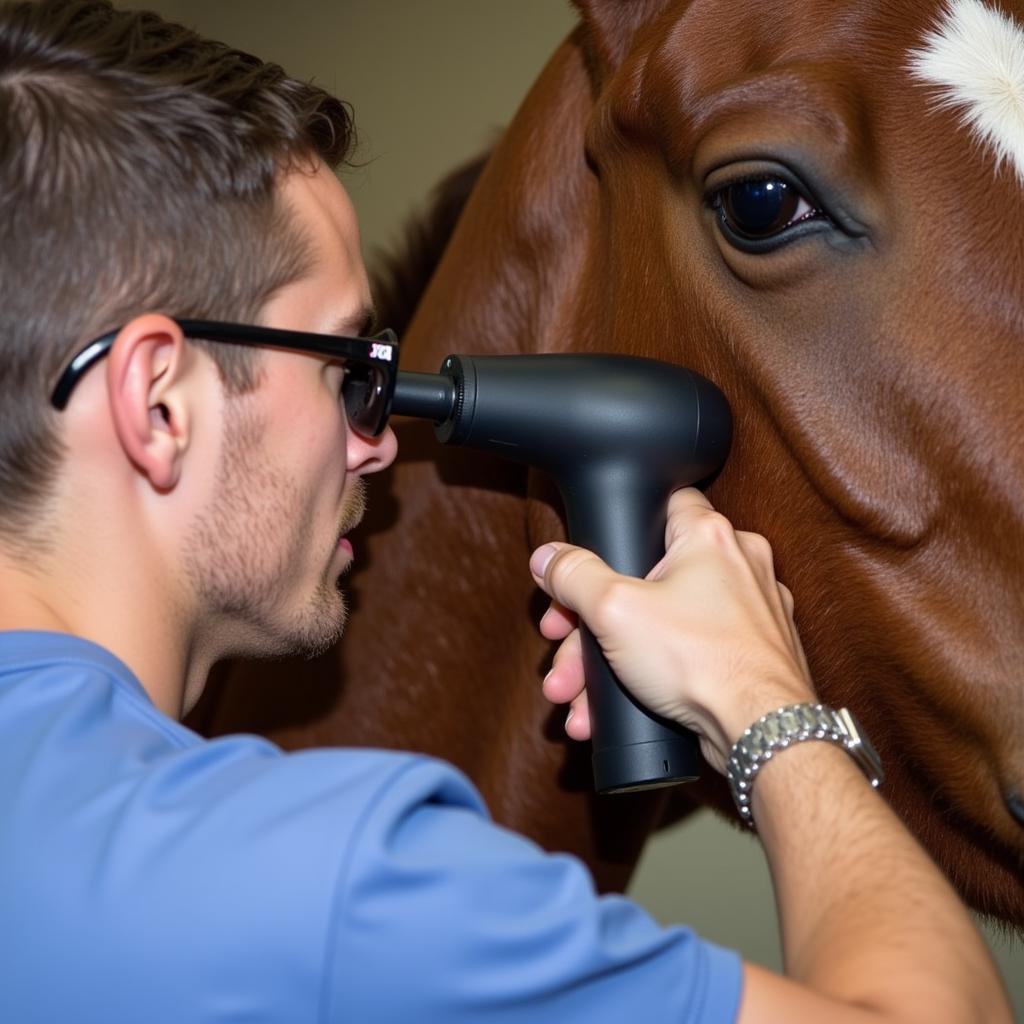A Deaf Horse can lead a fulfilling life with the right care and understanding. While deafness in horses can be congenital or acquired, it presents unique challenges for both the horse and the owner. This article delves into the intricacies of caring for a deaf horse, equipping you with the knowledge and strategies to ensure their well-being and build a trusting bond.
Recognizing Deafness in Horses
Identifying deafness in your horse is the crucial first step towards providing appropriate care.
Signs and Symptoms
Unlike other ailments, deafness doesn’t manifest as physical discomfort. Instead, watch out for these behavioral indicators:
- Unresponsiveness to Sound: Your horse might not react to loud noises, calls, or even the rustling of leaves.
- Head Tilting and Ear Positioning: A deaf horse may frequently tilt its head or position its ears abnormally in an attempt to pick up sounds.
- Startling Easily: Due to their inability to hear, deaf horses are easily startled by sudden movements or approaches.
- Difficulty with Cues: Training becomes challenging as the horse struggles to respond to vocal cues.
Causes of Deafness
Deafness in horses can stem from various factors:
- Congenital Deafness: Some horses are born deaf due to genetic predisposition or developmental issues in the womb. Certain breeds, like paint horses, have a higher likelihood of congenital deafness.
- Acquired Deafness: Horses can develop deafness later in life due to:
- Ear Infections: Chronic or untreated ear infections can damage the inner structures of the ear, leading to hearing loss.
- Trauma: Head injuries or trauma to the ears can also cause deafness.
- Medications: Certain medications, particularly some antibiotics, may have ototoxic effects, potentially causing hearing loss as a side effect.
- Aging: Like humans, horses can experience age-related hearing loss.
 Veterinarian Conducting an Ear Exam on a Horse
Veterinarian Conducting an Ear Exam on a Horse
Living and Caring for a Deaf Horse
Owning a deaf horse requires adjustments in your approach to communication, training, and overall care.
Communication Strategies
Building a connection with a deaf horse relies on visual cues and positive reinforcement:
- Visual Cues: Replace verbal commands with clear hand signals, body language, and even visual aids like flags.
- Positive Reinforcement: Reward desired behaviors with treats, pats, or a soothing voice. While they can’t hear your words, the tone and vibration can still be comforting.
Training Considerations
While challenging, training a deaf horse is possible with patience and consistency:
- Start Young: If you have a congenitally deaf horse, begin training early to establish communication methods.
- Professional Help: Consider enlisting a trainer experienced with deaf horses for guidance.
- Focus on Groundwork: Solid groundwork, using clear visual cues, forms the foundation for training.
- Desensitization: Gradually desensitize your horse to touch and movement to minimize startling.
Safety Precautions
Ensuring the safety of both you and your deaf horse is paramount:
- Secure Environments: Keep your horse in a well-fenced area to prevent them from wandering off due to a lack of auditory awareness.
- Approach with Caution: Always approach your deaf horse with caution, making your presence known visually to avoid startling them.
- Riding Companions: If riding with others, ensure they are aware of your horse’s deafness and maintain a safe distance.
- Consider Alternatives: Explore alternative activities like groundwork, liberty work, or driving if riding poses safety concerns.
A Rewarding Journey
While caring for a deaf horse presents unique challenges, the bond you create is incredibly special. Their inability to hear makes them more attuned to your body language and energy, strengthening your connection. Remember, with understanding, patience, and a little adaptation, a deaf horse can thrive and bring immense joy to their owner’s life.
FAQs about Deaf Horses
Q: Can deaf horses live a normal lifespan?
A: Yes, deafness doesn’t affect a horse’s lifespan. With proper care, they can live long and healthy lives.
Q: Are deaf horses more prone to certain health problems?
A: Deafness itself doesn’t make a horse more susceptible to specific health issues. However, the underlying cause of deafness, such as an infection, might require ongoing management.
Q: Can I ride a deaf horse?
A: Riding a deaf horse can be possible but depends on the individual horse’s temperament and your experience. Safety should always be the priority.
Q: Where can I find resources and support for owning a deaf horse?
A: Organizations dedicated to horses often have resources and support groups for owners of deaf horses.
Q: Are there any special considerations for feeding a deaf horse?
A: Feeding routines for deaf horses are the same as hearing horses. However, always make your presence known visually before approaching a deaf horse during feeding time to avoid startling them.
Do You Have More Questions About Caring for Your Horse?
For more information and resources on horse care, visit our white paint for horses page.
Need Personalized Advice for Your Equine Friend?
Contact us at Phone Number: 0772127271, Email: [email protected] Or visit us at: QGM2+WX2, Vị Trung, Vị Thuỷ, Hậu Giang, Việt Nam. We have a dedicated customer support team available 24/7 to assist you.